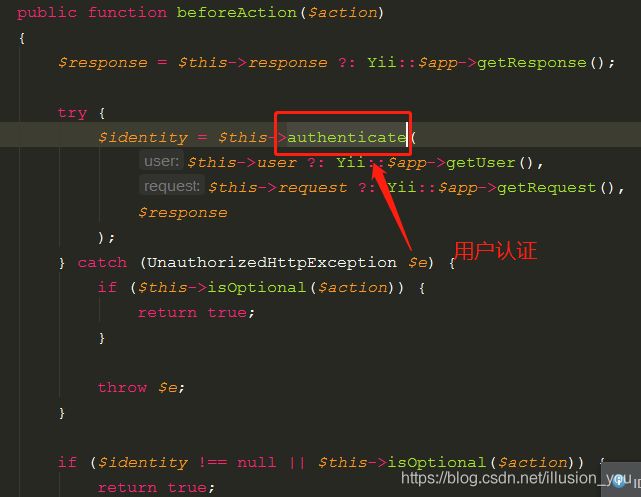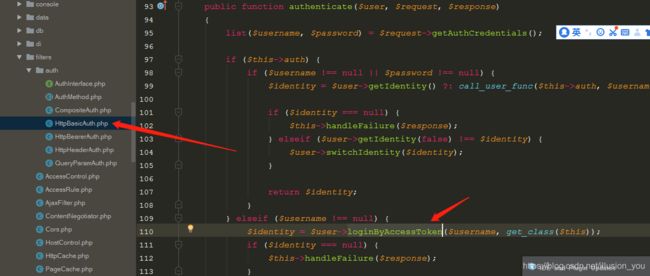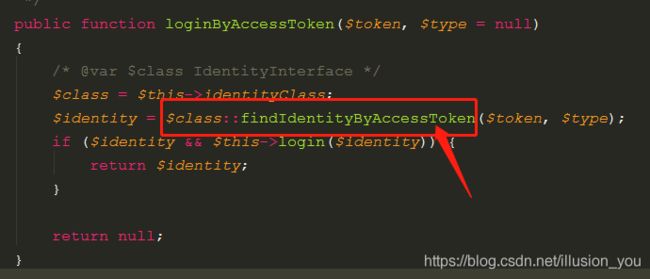- yii2自动跳转登陆 ie低版本无效
飞狐or
ie低版本访问yii2框架yii2初始化配置phpyii2后端
Yii2ie低版本访问登陆页面报错如图不能自行跳转到登陆界面如图不能自行跳转到登陆界面查找原因Yii2默认验证请求头类型为public$acceptableRedirectTypes=['text/html','application/xhtml+xml'];ie低版本请求头内容类型为'application/x-ms-application'将ie请求类型增加到yii2\web\user.php
- yii2 中获取 模块、控制器、方法名的方法
爱好者777
yiiphp
yii2中获取模块、控制器、方法名的方法在视图中在控制器中在控制器的beforeAction方法中(方法接收$action参数)在视图中模块名:$this->context->module->id;控制器名:$this->context->id;方法名:$this->context->action->id;在控制器中模块名:$this->module->id;控制器名:$this->id;方法名:
- Yii实现RabbitMQ队列
huaweichenai
rabbitmq分布式phpyii
一:拓展安装composerrequireyiisoft/yii2-queuecomposerrequireenqueue/amqp-lib2:RabbitMQ队列配置在配置文件中配置RabbitMQ队列'components'=>[...'queue'=>['class'=>yii\queue\amqp_interop\Queue::class,'host'=>'192.168.6.88',//
- Yii2 数据操作Query Builder
强哥83
Yii2
QueryBuilder$rows=(new\yii\db\Query())->select(['dyn_id','dyn_name'])->from('zs_dynasty')->where(['between','dyn_id',1,30])->limit(10)->all();print_r($rows);useyii\db\Query;$query=(newQuery())->from('
- Leetcode 154. Find Minimum in Rotated Sorted Array II
SnailTyan
文章作者:Tyan博客:noahsnail.com|CSDN|1.DescriptionFindMinimuminRotatedSortedArrayII2.SolutionclassSolution{public:intfindMin(vector&nums){intleft=0;intright=nums.size()-1;while(leftnums[left]){left=mid+1;}e
- yii2 redis 操作list 移除操作,lrem根据值进行移除
程序小院
yii2PHPredislistbootstrap
yii2redis操作list移除操作,lrem根据值进行移除移出并获取列表头部或尾部的第一个元素,如果没有值返回nullYii::$app->redis->lpop($key);Yii::$app->redis->rpop($key);根据值进行移除$len=Yii::$app->redis->LLEN($key);//获取元素个数Yii::$app->redis->lrem($key,$len
- yii2 layui文件上传带参数
程序小院
前端JavaScript模版layui前端javascript
yii2layui文件上传带参数前端资源文件上传layui.use(['form','layer','upload'],function(){$=layui.jquery;varform=layui.form,layer=layui.layer,upload=layui.upload;upload.render({accept:'file',size:'20480',elem:'#upload-
- yii 基于php的Rbac权限控制
fuck_life
YiiYiiRBAC权限控制
RBAC,基于角色的访问控制,对RBAC有问题的朋友,可以转移到:基于角色的访问控制RBAC一文,进行了解.Yii2中,实现的是NISTRBAC模型.Yii2中,的RBAC管理,涉及到的内容有:权限,角色,规则,为角色赋予权限,为用户分配角色.我们会以一个案例,贯穿整个RBAC的使用,请继续阅读,和跟随练习,保证可以全面了解Yii2的RBAC机制实现.目标案例准备准备一:控制器中的几个动作方法,完
- yii2 redis记录用户行为,list列表 重复过滤,新数据保留最前面
程序小院
数据库redislistbootstrap
yii2redis记录用户行为,list列表重复过滤,新数据保留最前面\Yii::$app->redis->lrem($key,0,json_encode($array,true));\Yii::$app->redis->lpush($key,json_encode($array,true));\Yii::$app->redis->expire($key,2592000);重复数据删除新的数据追加
- Yii2之类自动加载
xiaopzi123123
php
在yii中,程序中需要使用到的类无需事先加载其类文件,在使用的时候才自动定位类文件位置并加载之,这么高效的运行方式得益于yii的类自动加载机制。Yii的类自动加载实际上使用的是PHP的类自动加载,所以先来看看PHP的类自动加载。在PHP中,当程序中使用的类未加载时,在报错之前会先调用魔术方法__autoload(),所以我们可以重写__autoload()方法,定义当一个类找不到的时候怎么去根据类
- yii2 mongodb 操作
xiaopzi123123
mongodb数据库
->where(['['$in'=>$categoryIdArr]];类似mysqlin操作($categoryIdArr是数组)->where(['label'=>['$regex'=>'赞美诗']])模糊搜索操作$where=['status'=>1,'name'=>['$regex'=>$search]];多个条件查询andWhere()orWhere()查询字段->select(['tit
- Yii2.0 视图模版继承与模版相互调用
小马儿_
模板继承与模板之间的相互调用在控制器中单独定义父模板public$layout='home';publicfunctionactionIndex(){return$this->render('index');}在views文件夹下layouts文件夹写一个home.phpPageTitle我是父模板//通过此方法告诉继承文件的内容放在这里模板相互调用render('test');?>
- yii2视图渲染和前端请求及后台响应
我的楼兰0909
username:">password:request->csrfToken?>">$('.sub').on('click',function(){varjson={};json.username=$('.username').val();json.password=$('.password').val();json._csrf=$('#_csrf').val();$.ajax({url:'/?r
- yii2 PHP updateAll()方法和save()方法同时使用对同一个字段更新,出现的异常情况
huazeci
php
1、表结构2、使用updateAll()和save()方法同时对同一条数据进行更新,会出现异常情况【网上说是脏属性导致的】,大家可以自测可以看出如果设置字段的值为字符串值,则不影响最后的结果,但是如果设置的是整数值,则会影响最后想要的结果;避免这种情况出现,可以避免两个方法同时【可以上下都使用save()方法,如下图】3:同时使用save()方法,则不影响最后想要的结果结果:updateAll()
- YII2中使用orderby问题
huazeci
php工作
$list=$query->orderBy(['spt.create_time'=>SORT_DESC])->offset(($pageNumber-1)*$pageSize)->limit($pageSize)->asArray()->all();实际项目中如果相同值的create_time会有超过limit个数的情况,就会出现每次随机取pageSize个;例如相同值的有15个,但是limit是
- yii2报错 Access to debugger is denied due to IP address restriction. The requesting IP address is 172
huazeci
php工作
在main-local.php添加allowedIPs即可debug是接口调用需要gii是用gii生成model需要
- Yii2 Formatter 格式化时间使用
卢卡上学
PHPyii框架
yii\i18n\Formatter是一个格式化的小助手,对于我们实现前端用户友好的显示有非常大的帮助。一、常用的属性$dateFormat日期格式:yyyy-MM-dd,或者“short”,“medium”,“long”,or“full”$datetimeFormat具体时间格式:yyyy-MM-ddHH:mm:ss$locale区域位置,如果没有设置,将使用yii\base\Applicati
- PHP - Yii2 异步队列
卢卡上学
PHPphpyii队列
1.前言使用场景在PHPYii2中,队列是一种特殊的数据结构,用于处理和管理后台任务。队列允许我们将耗时的任务(如发送电子邮件、push通知等)放入队列中,然后在后台异步执行。这样可以避免在处理大量请求时阻塞主应用程序,从而提高应用程序的性能和响应能力。批量任务需要提高处理速度,比如10万个消息,可以起10个异步队列消费进程,同时消费。延时任务,如订单超时30分钟未支付,自动取消。在Yii2中,队
- 【多商户开源-BSD- Fecmall 电商平台】
临水逸
php用户运营
关于FecmallFecmall关于,Fecmall介绍Fecbbc开源BSD多商户系统,真正开源,商用免费授权的多商户系统Fecmall系统简介:全称为FancyECommerceShop,着重于电商架构的研发优化,全新定义商城的架构体系,是基于phpYii2框架之上开发的一款优秀的开源电商系统,易于系统升级,二次开发以及第三方扩展,代码100%开源,作为一款定位于商城框架功能齐全的电商系统,您
- Yii2 where里不转义某个字段方法|复杂条件拼接
s听风忆雪
php数据库yiiphp后端数据库
$query=$table::find()->select('id')->where(['and',['or',['time_type'=>1],['and',['time_type'=>2,],['or',['and',['start_time],['>=','end_time',$this->start_time],],['and',['end_time],['>=','end_time',$
- yii2自增自减写法
s听风忆雪
phpyii数据库php
$status=false;//自增/自减数量自减的话写成负数$editData['quantity']=new\Yii\db\Expression('`quantity`+10');//普通修改字段$editData['update_time']=time();//条件$where=['id'=>$id];try{$status=\Yii::$app->db->createCommand()->
- codeception在YII2中的使用
gao922699
codeception是一款PHP的行为测试工具,能自动化进行单元测试、功能测试、验收测试等。官网:http://codeception.com/Yii2框架已经默认集成了codeception,可以直接使用,否则需要安装。安装过程见官方。看一下高级版的frontend的tests目录结构:image.png默认已经集成了验收测试、功能测试、单元测试模块,研究里面的代码可以基本满足上述三项测试的要
- soar-php 2.0 - SQL 语句优化器和重写器的 PHP 扩展包、 方便 SQL 语句调优
guanguans
soar-php是一个基于小米公司开源的soar开发的PHP扩展包,方便框架中SQL语句调优。image环境要求PHP>=7.1ext-pdo框架中使用Laravel-laravel-web-soarThinkPHP-think-soarHyperf-hyperf-soarYii2SymfonySlim安装$composerrequireguanguans/soar-php--dev使用下载Xia
- php rabbitmq yii2,yii2 使用 rabbitmq 扩展监听、发送消息
一起快走吧
phprabbitmqyii2
RabbitMQ是一个在AMQP基础上实现的企业级消息系统。何谓消息系统,就是消息队列系统,消息队列是“消费-生产者模型”的一个典型的代表,一端往消息队列中不断写入消息,而另一端则可以读取或者订阅队列中的消息。在开始前确保php安装了amqp扩展,如果没有安装,可进行安装。安装可参考:php安装amqp扩展扩展地址扩展安装composerrequiremikemadisonweb/yii2-rab
- YII2 前后台用户分离
JunChow520
后台隶属于系统管理员登录范畴,此处使用admin表作为基础,其基础字段与user表保持一致。后台登录模块采用独立模型和表单模型来完成。1.创建后台管理员表详情参见:“账户管理”2.修改后台主配置文件/backend/config/main.php'components'=>['request'=>['csrfParam'=>'_csrf-backend',],'user'=>['identityC
- 关于Yii2基础controller和model的封装
浪里小韭菜
数据库phpyii
如题,在实战项目中我们我们经常会要使用相同的逻辑,比如post/get获取参数,接口返回、参数校验等,因此可以将其封装起来调用。这里分为根目录下的控制器controllers和处理数据库的models两个文件,其他业务逻辑放在modules模块中一、根目录下controllers//BaseController.phproute=Yii::$app->requestedRoute;Yii::inf
- Yii2关于urlManager美化配置
浪里小韭菜
phpyii
如题,为了api更加符合restful风格需要配置//url美化'urlManager'=>['enablePrettyUrl'=>true,'showScriptName'=>false,'enableStrictParsing'=>false,'rules'=>[//['class'=>'yii\rest\UrlRule','controller'=>['login']],//方法一:针对特定
- Yii2.x Modules 配置 RESTful api 使用
胡乱唱歌ing
配置giiconfig/main-local.phpif(!YII_ENV_TEST){//configurationadjustmentsfor'dev'environment$config['bootstrap'][]='debug';$config['modules']['debug']=['class'=>'yii\debug\Module',];$config['bootstrap'][
- 【PHP】查询用户的直推、非直推、二级、三级、团队人数示例
zzoood
phpmysqlyii2php
目录1.构建公共函数,命名为team2.使用方法,以yii2为例首先在你的user表需要有一个字段串联推荐关系,如:我的id是666上级关系字段是superior字段值是:333_222_111或333,222,1111.构建公共函数,命名为teamandWhere("$columnREGEXP'^{$uid}_'");}elseif($level==2){//非直推$this->andWhere
- Yii2基于header实现版本控制
killtl
Yii2官方给出的方案是基于url的版本控制,但是我们的versoin放在header里面,需要通过header来进行版本控制,实现如下:首先在基类中实现actions,actions是针对controller的action扩展,看源码可以知道,在createAction中会先检查actionMap,而actionMap=actions(),也就是说actions里面的配置优先于controlle
- [黑洞与暗粒子]没有光的世界
comsci
无论是相对论还是其它现代物理学,都显然有个缺陷,那就是必须有光才能够计算
但是,我相信,在我们的世界和宇宙平面中,肯定存在没有光的世界....
那么,在没有光的世界,光子和其它粒子的规律无法被应用和考察,那么以光速为核心的
&nbs
- jQuery Lazy Load 图片延迟加载
aijuans
jquery
基于 jQuery 的图片延迟加载插件,在用户滚动页面到图片之后才进行加载。
对于有较多的图片的网页,使用图片延迟加载,能有效的提高页面加载速度。
版本:
jQuery v1.4.4+
jQuery Lazy Load v1.7.2
注意事项:
需要真正实现图片延迟加载,必须将真实图片地址写在 data-original 属性中。若 src
- 使用Jodd的优点
Kai_Ge
jodd
1. 简化和统一 controller ,抛弃 extends SimpleFormController ,统一使用 implements Controller 的方式。
2. 简化 JSP 页面的 bind, 不需要一个字段一个字段的绑定。
3. 对 bean 没有任何要求,可以使用任意的 bean 做为 formBean。
使用方法简介
- jpa Query转hibernate Query
120153216
Hibernate
public List<Map> getMapList(String hql,
Map map) {
org.hibernate.Query jpaQuery = entityManager.createQuery(hql);
if (null != map) {
for (String parameter : map.keySet()) {
jp
- Django_Python3添加MySQL/MariaDB支持
2002wmj
mariaDB
现状
首先,
[email protected] 中默认的引擎为 django.db.backends.mysql 。但是在Python3中如果这样写的话,会发现 django.db.backends.mysql 依赖 MySQLdb[5] ,而 MySQLdb 又不兼容 Python3 于是要找一种新的方式来继续使用MySQL。 MySQL官方的方案
首先据MySQL文档[3]说,自从MySQL
- 在SQLSERVER中查找消耗IO最多的SQL
357029540
SQL Server
返回做IO数目最多的50条语句以及它们的执行计划。
select top 50
(total_logical_reads/execution_count) as avg_logical_reads,
(total_logical_writes/execution_count) as avg_logical_writes,
(tot
- spring UnChecked 异常 官方定义!
7454103
spring
如果你接触过spring的 事物管理!那么你必须明白 spring的 非捕获异常! 即 unchecked 异常! 因为 spring 默认这类异常事物自动回滚!!
public static boolean isCheckedException(Throwable ex)
{
return !(ex instanceof RuntimeExcep
- mongoDB 入门指南、示例
adminjun
javamongodb操作
一、准备工作
1、 下载mongoDB
下载地址:http://www.mongodb.org/downloads
选择合适你的版本
相关文档:http://www.mongodb.org/display/DOCS/Tutorial
2、 安装mongoDB
A、 不解压模式:
将下载下来的mongoDB-xxx.zip打开,找到bin目录,运行mongod.exe就可以启动服务,默
- CUDA 5 Release Candidate Now Available
aijuans
CUDA
The CUDA 5 Release Candidate is now available at http://developer.nvidia.com/<wbr></wbr>cuda/cuda-pre-production. Now applicable to a broader set of algorithms, CUDA 5 has advanced fe
- Essential Studio for WinRT网格控件测评
Axiba
JavaScripthtml5
Essential Studio for WinRT界面控件包含了商业平板应用程序开发中所需的所有控件,如市场上运行速度最快的grid 和chart、地图、RDL报表查看器、丰富的文本查看器及图表等等。同时,该控件还包含了一组独特的库,用于从WinRT应用程序中生成Excel、Word以及PDF格式的文件。此文将对其另外一个强大的控件——网格控件进行专门的测评详述。
网格控件功能
1、
- java 获取windows系统安装的证书或证书链
bewithme
windows
有时需要获取windows系统安装的证书或证书链,比如说你要通过证书来创建java的密钥库 。
有关证书链的解释可以查看此处 。
public static void main(String[] args) {
SunMSCAPI providerMSCAPI = new SunMSCAPI();
S
- NoSQL数据库之Redis数据库管理(set类型和zset类型)
bijian1013
redis数据库NoSQL
4.sets类型
Set是集合,它是string类型的无序集合。set是通过hash table实现的,添加、删除和查找的复杂度都是O(1)。对集合我们可以取并集、交集、差集。通过这些操作我们可以实现sns中的好友推荐和blog的tag功能。
sadd:向名称为key的set中添加元
- 异常捕获何时用Exception,何时用Throwable
bingyingao
用Exception的情况
try {
//可能发生空指针、数组溢出等异常
} catch (Exception e) {
- 【Kafka四】Kakfa伪分布式安装
bit1129
kafka
在http://bit1129.iteye.com/blog/2174791一文中,实现了单Kafka服务器的安装,在Kafka中,每个Kafka服务器称为一个broker。本文简单介绍下,在单机环境下Kafka的伪分布式安装和测试验证 1. 安装步骤
Kafka伪分布式安装的思路跟Zookeeper的伪分布式安装思路完全一样,不过比Zookeeper稍微简单些(不
- Project Euler
bookjovi
haskell
Project Euler是个数学问题求解网站,网站设计的很有意思,有很多problem,在未提交正确答案前不能查看problem的overview,也不能查看关于problem的discussion thread,只能看到现在problem已经被多少人解决了,人数越多往往代表问题越容易。
看看problem 1吧:
Add all the natural num
- Java-Collections Framework学习与总结-ArrayDeque
BrokenDreams
Collections
表、栈和队列是三种基本的数据结构,前面总结的ArrayList和LinkedList可以作为任意一种数据结构来使用,当然由于实现方式的不同,操作的效率也会不同。
这篇要看一下java.util.ArrayDeque。从命名上看
- 读《研磨设计模式》-代码笔记-装饰模式-Decorator
bylijinnan
java设计模式
声明: 本文只为方便我个人查阅和理解,详细的分析以及源代码请移步 原作者的博客http://chjavach.iteye.com/
import java.io.BufferedOutputStream;
import java.io.DataOutputStream;
import java.io.FileOutputStream;
import java.io.Fi
- Maven学习(一)
chenyu19891124
Maven私服
学习一门技术和工具总得花费一段时间,5月底6月初自己学习了一些工具,maven+Hudson+nexus的搭建,对于maven以前只是听说,顺便再自己的电脑上搭建了一个maven环境,但是完全不了解maven这一强大的构建工具,还有ant也是一个构建工具,但ant就没有maven那么的简单方便,其实简单点说maven是一个运用命令行就能完成构建,测试,打包,发布一系列功
- [原创]JWFD工作流引擎设计----节点匹配搜索算法(用于初步解决条件异步汇聚问题) 补充
comsci
算法工作PHP搜索引擎嵌入式
本文主要介绍在JWFD工作流引擎设计中遇到的一个实际问题的解决方案,请参考我的博文"带条件选择的并行汇聚路由问题"中图例A2描述的情况(http://comsci.iteye.com/blog/339756),我现在把我对图例A2的一个解决方案公布出来,请大家多指点
节点匹配搜索算法(用于解决标准对称流程图条件汇聚点运行控制参数的算法)
需要解决的问题:已知分支
- Linux中用shell获取昨天、明天或多天前的日期
daizj
linuxshell上几年昨天获取上几个月
在Linux中可以通过date命令获取昨天、明天、上个月、下个月、上一年和下一年
# 获取昨天
date -d 'yesterday' # 或 date -d 'last day'
# 获取明天
date -d 'tomorrow' # 或 date -d 'next day'
# 获取上个月
date -d 'last month'
#
- 我所理解的云计算
dongwei_6688
云计算
在刚开始接触到一个概念时,人们往往都会去探寻这个概念的含义,以达到对其有一个感性的认知,在Wikipedia上关于“云计算”是这么定义的,它说:
Cloud computing is a phrase used to describe a variety of computing co
- YII CMenu配置
dcj3sjt126com
yii
Adding id and class names to CMenu
We use the id and htmlOptions to accomplish this. Watch.
//in your view
$this->widget('zii.widgets.CMenu', array(
'id'=>'myMenu',
'items'=>$this-&g
- 设计模式之静态代理与动态代理
come_for_dream
设计模式
静态代理与动态代理
代理模式是java开发中用到的相对比较多的设计模式,其中的思想就是主业务和相关业务分离。所谓的代理设计就是指由一个代理主题来操作真实主题,真实主题执行具体的业务操作,而代理主题负责其他相关业务的处理。比如我们在进行删除操作的时候需要检验一下用户是否登陆,我们可以删除看成主业务,而把检验用户是否登陆看成其相关业务
- 【转】理解Javascript 系列
gcc2ge
JavaScript
理解Javascript_13_执行模型详解
摘要: 在《理解Javascript_12_执行模型浅析》一文中,我们初步的了解了执行上下文与作用域的概念,那么这一篇将深入分析执行上下文的构建过程,了解执行上下文、函数对象、作用域三者之间的关系。函数执行环境简单的代码:当调用say方法时,第一步是创建其执行环境,在创建执行环境的过程中,会按照定义的先后顺序完成一系列操作:1.首先会创建一个
- Subsets II
hcx2013
set
Given a collection of integers that might contain duplicates, nums, return all possible subsets.
Note:
Elements in a subset must be in non-descending order.
The solution set must not conta
- Spring4.1新特性——Spring缓存框架增强
jinnianshilongnian
spring4
目录
Spring4.1新特性——综述
Spring4.1新特性——Spring核心部分及其他
Spring4.1新特性——Spring缓存框架增强
Spring4.1新特性——异步调用和事件机制的异常处理
Spring4.1新特性——数据库集成测试脚本初始化
Spring4.1新特性——Spring MVC增强
Spring4.1新特性——页面自动化测试框架Spring MVC T
- shell嵌套expect执行命令
liyonghui160com
一直都想把expect的操作写到bash脚本里,这样就不用我再写两个脚本来执行了,搞了一下午终于有点小成就,给大家看看吧.
系统:centos 5.x
1.先安装expect
yum -y install expect
2.脚本内容:
cat auto_svn.sh
#!/bin/bash
- Linux实用命令整理
pda158
linux
0. 基本命令 linux 基本命令整理
1. 压缩 解压 tar -zcvf a.tar.gz a #把a压缩成a.tar.gz tar -zxvf a.tar.gz #把a.tar.gz解压成a
2. vim小结 2.1 vim替换 :m,ns/word_1/word_2/gc
- 独立开发人员通向成功的29个小贴士
shoothao
独立开发
概述:本文收集了关于独立开发人员通向成功需要注意的一些东西,对于具体的每个贴士的注解有兴趣的朋友可以查看下面标注的原文地址。
明白你从事独立开发的原因和目的。
保持坚持制定计划的好习惯。
万事开头难,第一份订单是关键。
培养多元化业务技能。
提供卓越的服务和品质。
谨小慎微。
营销是必备技能。
学会组织,有条理的工作才是最有效率的。
“独立
- JAVA中堆栈和内存分配原理
uule
java
1、栈、堆
1.寄存器:最快的存储区, 由编译器根据需求进行分配,我们在程序中无法控制.2. 栈:存放基本类型的变量数据和对象的引用,但对象本身不存放在栈中,而是存放在堆(new 出来的对象)或者常量池中(字符串常量对象存放在常量池中。)3. 堆:存放所有new出来的对象。4. 静态域:存放静态成员(static定义的)5. 常量池:存放字符串常量和基本类型常量(public static f



